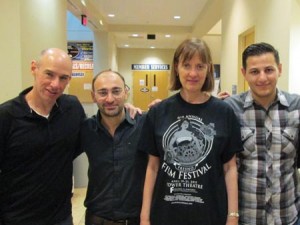Ruzan Orkusyan
Staff Writer

Photo: Barlow Der Mugrdechian
Documentary and fairytale, film and animation–the different genres piece together to paint a startling truth of Turkish denial and revisionism regarding the Armenian Genocide. Mathieu Zeitindjioglou’s movie “The Son of the Olive Merchant” was screened as part of the CineCulture film series and class on Friday, April 12, and was co-sponsored by the Armenian Studies Program.
A large audience of three hundred was in attendance at the Peters Educational Center auditorium to welcome filmmaker Zeitindjioglou, who had flown in from Paris to be present at the Fresno premiere. Prof. Mary Husain, who teaches the CineCulture class, introduced the director, explaining the importance of screening such a film. The CineCulture club is headed by President Narek Avetisyan.
The film underscores Martin Scorsese’s quote, “Now more than ever we need to talk to each other, to listen to each other and understand how we see the world, and cinema is the best medium for doing this.”
“The Son of the Olive Merchant” chronicles Anna and Mathieu Zeitindjioglou’s honeymoon to Turkey and their search for the truth about Mathieu’s Armenian heritage and the Armenian Genocide. With a simple camera, the couple travels throughout Turkey, questioning and discussing with people they meet about the “Armenian problem,” careful not to provoke controversy by using the word “Genocide.” In addition to the honeymoon footage, the film also includes additional interviews with historians, news footage, historical documents, and an animation that tells the story of Mathieu’s ancestors.
By presenting the stark truth, “The Son of the Olive Merchant” not only educates the audience about the Armenian Genocide, but more importantly, it provides a unique, yet unpleasant glimpse into Turkish culture that highlights Turkish ignorance and denial of the Armenian Genocide. With its passion, the movie motivates Armenians and non-Armenians alike to find the Armenian within them and fight the injustice of denial.
There were scenes that were difficult to watch, such as that showing beautiful Armenian churches turned into stables. There were clips that showed some Turks completely denying the Genocide, and in addition, saying that the Armenians were the perpetrators, and that the Armenians committed Genocide against the Turks. It was disturbing to find out that the Turkish government has warped the history of Armenian and Turkish relations, and what is more, it displays these lies in museums and history books. These museums and history books portray Armenian victims as Turkish victims, giving a false voice to those who will never speak again.
One man interviewed in the movie did not admit to Genocide, but claimed killing the Armenians was necessary to protect the Turkish families. But if this is so, then why kill millions of Armenians, women, children, and elderly?
The movie, although personal and passionate, provided an objective view. When interviewing Turks, Mathieu and Anna hid their sentiments, and with persistence, poked and prodded for the truth, revealing the nature of Turkish revisionism. The animation detailed the story of Mathieu’s paternal grandfather, who escaped the Genocide by changing his last name to a Turkish one. In his disguise, he was able to eventually move to France, but he and his descendents were forever forced to carry the name of those who killed their people.
While a documentary, “The Son of the Olive Merchant” was a personal journey for the director. His voyage did not lead him to absolute truth, but rather to the discovery that truth is subjective and understanding who is right and wrong is difficult. One thing remained clear, as long as revisionism continues, the scars of Armenian and Turkish relations will never mend, but at least “The Son of the Olive Merchant” can begin to educate everyone about these issues, motivating even non-Armenians to ask questions, expand their knowledge, and fight alongside the Armenians for justice.
 Hye Sharzhoom Armenian Action
Hye Sharzhoom Armenian Action